Vitalik's 256 ETH Donation: A Strategic Turning Point for the Privacy Communication Sector
Author: David, TechFlow
Original Title: Vitalik Donated 256 ETH to 2 Chat Apps You've Never Heard Of—What Exactly Is He Betting On?
When you truly support something, the most direct way is to fund it.
On November 26, Vitalik Buterin donated 128 ETH each to two privacy messaging apps, Session and SimpleX, totaling approximately $760,000.
He wrote in a tweet: Encrypted messaging is crucial for protecting digital privacy. The next key step is to achieve permissionless account creation and metadata privacy.
$760,000 is no small sum, but what's even more intriguing are these two apps that received the funds.
Session and SimpleX are virtually unknown outside the crypto community. Why did Vitalik choose to invest in them instead of more established privacy messaging tools?
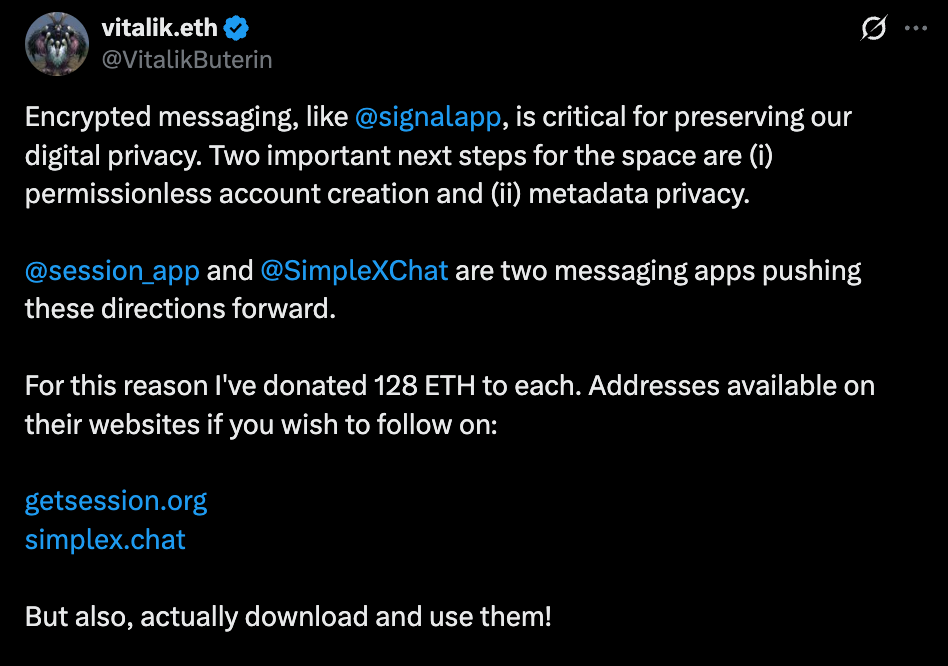
The donation amount itself is also interesting.
128 is not a convenient number for humans, but in binary, it is 2 to the 7th power. Some community members interpret this as a statement from Vitalik—a structural investment in privacy, not just a casual tip.
Just one day before the donation, the Council of the European Union reached an agreement on the "Chat Control" proposal. This proposal requires messaging platforms to scan users' private messages and is seen by privacy advocates as a direct threat to end-to-end encryption.
Vitalik chose to make his donation public at this time, making his stance clear: he believes current privacy messaging solutions are not enough and that more radical alternatives need support.
The market seems to have picked up on this signal. Session's token SESH surged from less than $0.04 to around $0.40 after the news broke, a weekly increase of over 450%.
Let's take a quick look at what these two apps are and why they are worth Vitalik's bet.

Session: Using DePIN for Private Messaging
Session is a decentralized, end-to-end encrypted messaging app that officially launched in 2020 and currently has nearly 1 million users.
It was originally developed by Australia's Oxen Privacy Tech Foundation. In 2024, due to tightening privacy legislation in Australia, the team moved its operations to Switzerland and established the Session Technology Foundation.
The app's core selling point is "no phone number required."
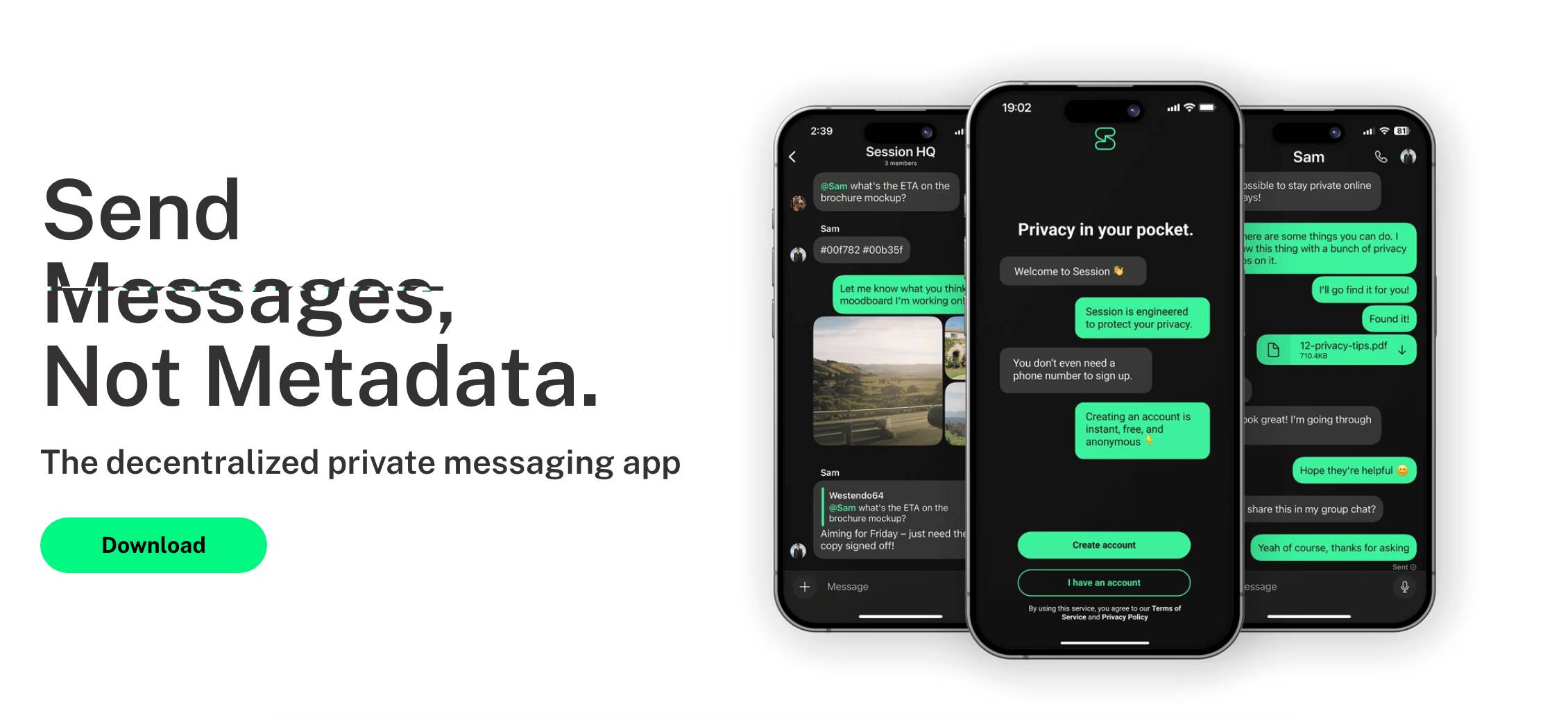
When registering, Session generates a 66-character random string as your Session ID and provides you with a set of mnemonic words for account recovery. There is no phone number binding, no email verification, and no information that can be linked to your real identity.
Technically, Session uses an onion routing-like architecture to ensure privacy.
Every message you send is encrypted in three layers and passes through three randomly selected nodes in sequence. Each node can only decrypt its own layer and cannot see the full path of the message. This means no single node can know both the sender and receiver of a message at the same time.
These nodes are not servers operated by Session itself but come from the community. Currently, there are over 1,500 Session Nodes distributed across more than 50 countries worldwide. Anyone can run a node, provided they stake 25,000 SESH tokens.
In May 2025, Session completed a major upgrade, migrating from the original Oxen network to its own Session Network. The new network is based on a proof-of-stake consensus, where node operators participate in network maintenance and receive rewards by staking SESH.

In terms of user experience, Session's interface is not much different from mainstream messaging apps. It supports text, voice messages, images, and file transfers, as well as encrypted group chats of up to 100 people. Voice and video calls are still in the testing phase.
An obvious drawback is notification delay. Because messages have to go through multiple routing hops, sometimes delivery is a few seconds slower—or even longer—than centralized apps. Multi-device synchronization is also not very smooth, which is a common issue with decentralized architectures.
SimpleX: Extreme Privacy Without Even an ID
If Session's selling point is "no phone number required," SimpleX goes even further:
It doesn't even have user IDs.
Almost all messaging apps on the market, no matter how much they emphasize privacy, assign some kind of identifier to users. Telegram uses phone numbers, Signal uses phone numbers, Session uses randomly generated Session IDs.
Even if these identifiers are not linked to real identities, they leave traces: if you chat with two people using the same account, those two people can theoretically confirm they are talking to the same person.
SimpleX eliminates this identifier altogether. Every time you connect with a new contact, the system generates a pair of one-time message queue addresses. The address you use to chat with A is completely different from the one you use with B, with no shared metadata.
Even if someone monitors both conversations at the same time, they cannot prove they come from the same person.
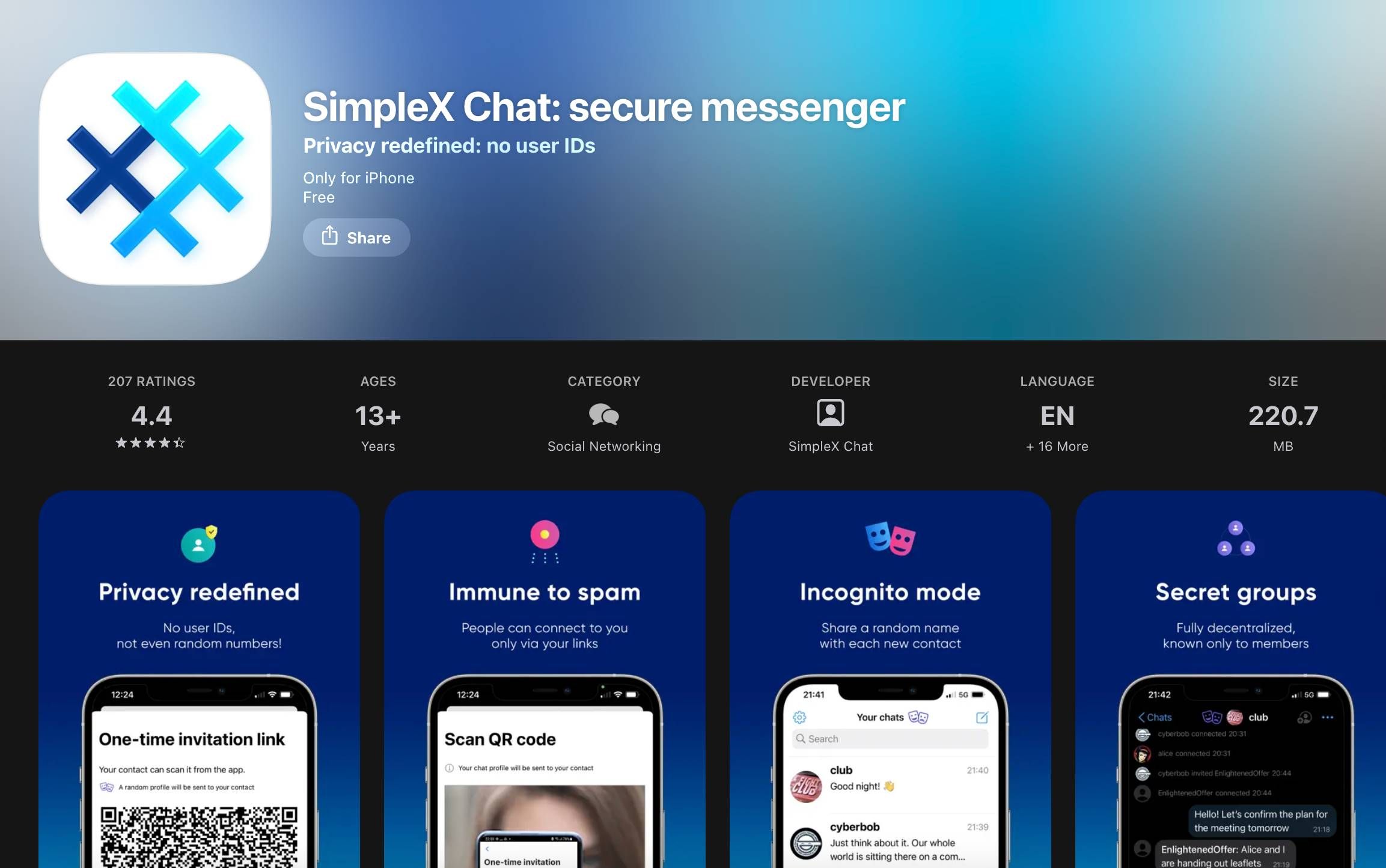
Even if someone monitors both conversations at the same time, they cannot prove they come from the same person.
This makes registering for SimpleX a unique experience. After opening the app, you only need to enter a display name—no phone number, no email, not even a password. This profile is stored entirely on your local device, with no account information on SimpleX's servers.
The way you add contacts is also different. You need to generate a one-time invitation link or QR code and send it to the other party, who can only establish a connection by clicking it. There is no "search username to add friend" function, because there are no usernames to search for.
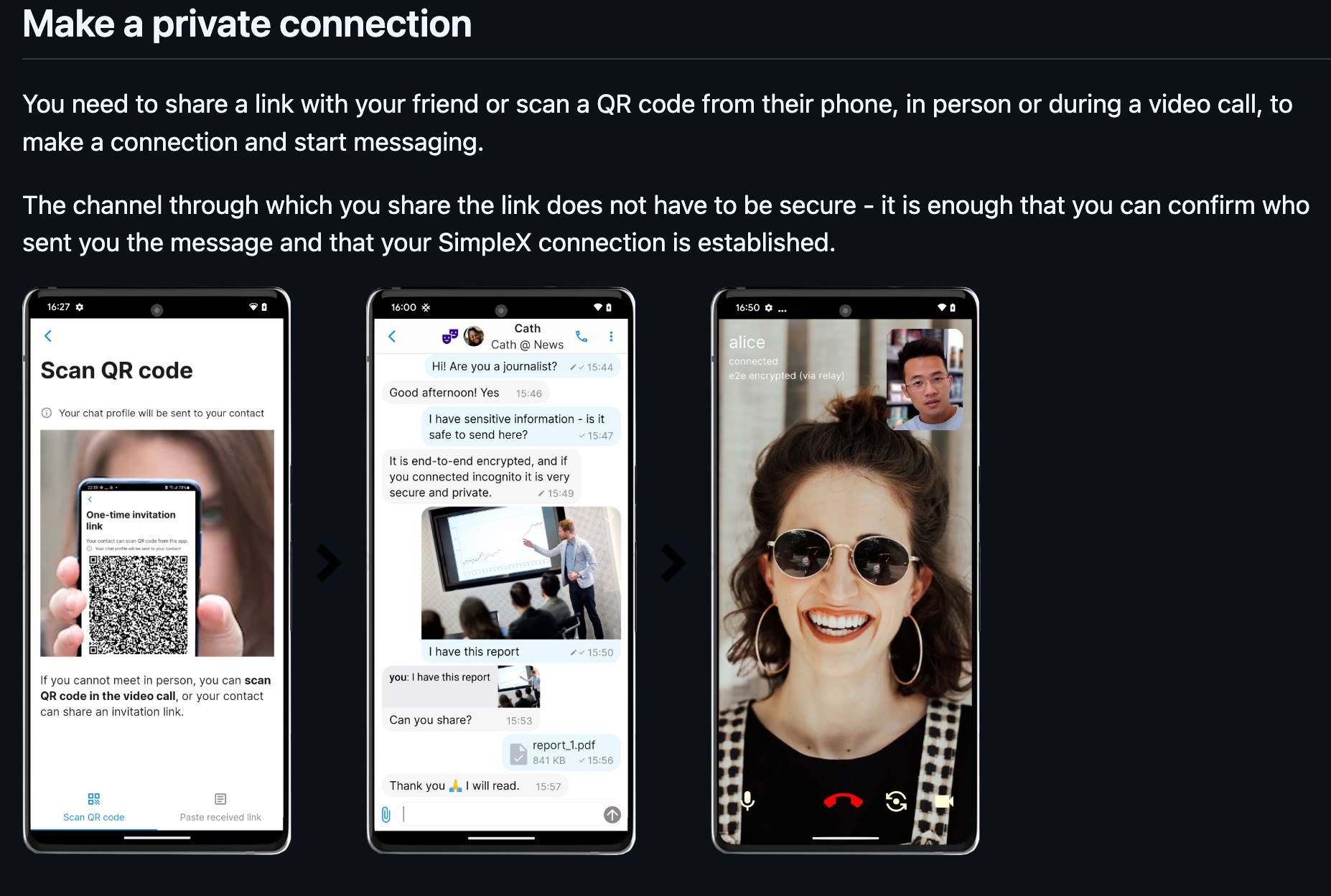
Technically, SimpleX uses its own SimpleX Messaging Protocol. Messages are relayed through servers, but these servers only temporarily store encrypted messages, do not keep any user records, and do not communicate with each other. Messages are deleted after delivery. Servers cannot see who you are or who you are chatting with.
This design is extremely privacy-focused.
By the way, the app is open source on Github, with more information available there.
SimpleX was founded in London in 2021 by Evgeny Poberezkin. In 2022, it received a pre-seed round led by Village Global, and Jack Dorsey has publicly expressed support for the project. The app is fully open source and has passed a security audit by Trail of Bits.
In terms of user experience, SimpleX has a relatively simple interface and supports text, voice messages, images, files, and self-destructing messages. Group chat is available, but because there is no centralized member list management, the experience in large groups is not as good as traditional apps. Voice calls are available, but video calls still have some stability issues.
A notable limitation is: because there is no unified user ID, if you change devices or lose your local data, you need to reconnect with each contact individually. There is no "log in to recover all chat history."
This is also the price of extreme privacy design.
Business Model Comparison: Token Incentives vs. Deliberate De-Financialization
Both apps focus on private messaging, but their business model choices are completely different.
Session follows the typical Web3 route, using tokens to align the interests of network participants. SESH is the native token of the Session Network, with three main uses:
-
Running a node requires staking 25,000 SESH as collateral;
-
Node operators earn SESH rewards for providing message routing and storage services;
-
In the future, paid features such as Session Pro membership and Session Name Service will also be settled in SESH.
The logic of this model is: node operators have economic incentives to maintain network stability, the staking mechanism increases the cost of malicious behavior, and token circulation provides a sustainable source of funding for the project. Currently, SESH has a circulating supply of about 79 million, a maximum supply of 240 million, and over 62 million SESH are locked in the Staking Reward Pool as node reward reserves.
After Vitalik's donation, SESH rose from less than $0.04 to over $0.20 within hours, with its market cap briefly surpassing $16 million. This surge is partly due to hype, but it also shows the market is pricing the "privacy infrastructure" narrative.
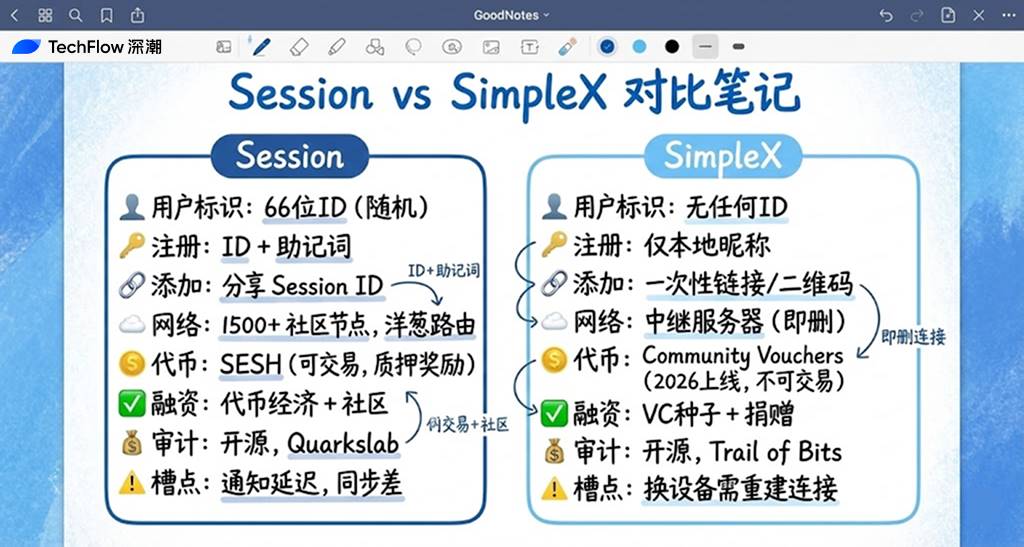
SimpleX has taken the opposite approach. Founder Evgeny Poberezkin has explicitly stated that there will be no tradable token, as he believes the speculative nature of tokens would divert the project from its original purpose.
SimpleX's current funding comes from VC investment and user donations. The 2022 pre-seed round raised about $370,000, and user donations have totaled over $25,000. The team plans to launch Community Vouchers in 2026 for sustainable operations.
Community Vouchers are a type of restricted utility token, essentially prepaid server usage coupons. Users purchase Vouchers to pay for the server costs of their communities, with funds distributed to server operators and the SimpleX network. The key difference: these Vouchers are non-tradable, have no pre-mining, no public sale, and a fixed purchase price.
It seems SimpleX has deliberately blocked any possibility of financial speculation.
Both approaches have pros and cons. Session's token model can quickly attract node operators and capital attention, but also exposes the project to token price volatility and regulatory risks. SimpleX's de-financialized design keeps the project pure, but with limited funding sources, expansion will be slower.
This is not just a difference in business strategy, but also reflects different understandings of "how privacy should be funded."
Common Challenges in Private Messaging
Vitalik did not only say good things in his donation tweet. He clearly pointed out:
Both apps are imperfect, and there is still a long way to go to achieve true user experience and security. The challenges he mentioned are actually structural issues for the entire private messaging sector.
The first is the cost of decentralization itself. Centralized apps deliver messages quickly, stably, and smoothly because all data passes through the same set of servers, allowing for extensive optimization. Once you go decentralized, messages have to hop between multiple independent nodes, and delays become inevitable.
The second is multi-device synchronization. With Telegram or WhatsApp, you log in on a new phone and your chat history is restored. But in a decentralized architecture, there is no central server storing your data, so multi-device sync relies on end-to-end key synchronization, which is much more technically complex.
The third is Sybil attacks and DoS protection. Centralized platforms use phone number registration, which naturally filters out spam accounts and malicious attacks. If you remove phone number binding, how do you prevent people from mass-creating fake accounts to harass users or attack the network?
If you want decentralization, you have to sacrifice some user experience; if you want permissionless registration, you need to find other ways to prevent abuse; if you want multi-device sync, you have to balance privacy and convenience.
Vitalik's decision to fund these two projects at this time is, to some extent, a statement: these problems are worth solving, and solving them requires funding and attention.
For ordinary users, it may still be too early to switch to Session or SimpleX, as there are indeed shortcomings in user experience. But if you care about your digital privacy, it's at least worth downloading and trying them out to see just how far "real privacy" can go.
After all, when Vitalik is willing to put real money behind something, it's probably more than just a geek's self-indulgence.
Disclaimer: The content of this article solely reflects the author's opinion and does not represent the platform in any capacity. This article is not intended to serve as a reference for making investment decisions.
You may also like
Dragonfly Partner’s heartfelt essay: Reject Cynicism, Embrace Exponential Thinking
The industry's focus is shifting from Silicon Valley to Wall Street, which is a foolish trap.

Vitalik's 256 ETH Bold Gamble: Privacy Communication Needs More Radical Solutions
He made it clear that neither of these two applications is perfect, and there is still a long way to go to achieve true user experience and security.
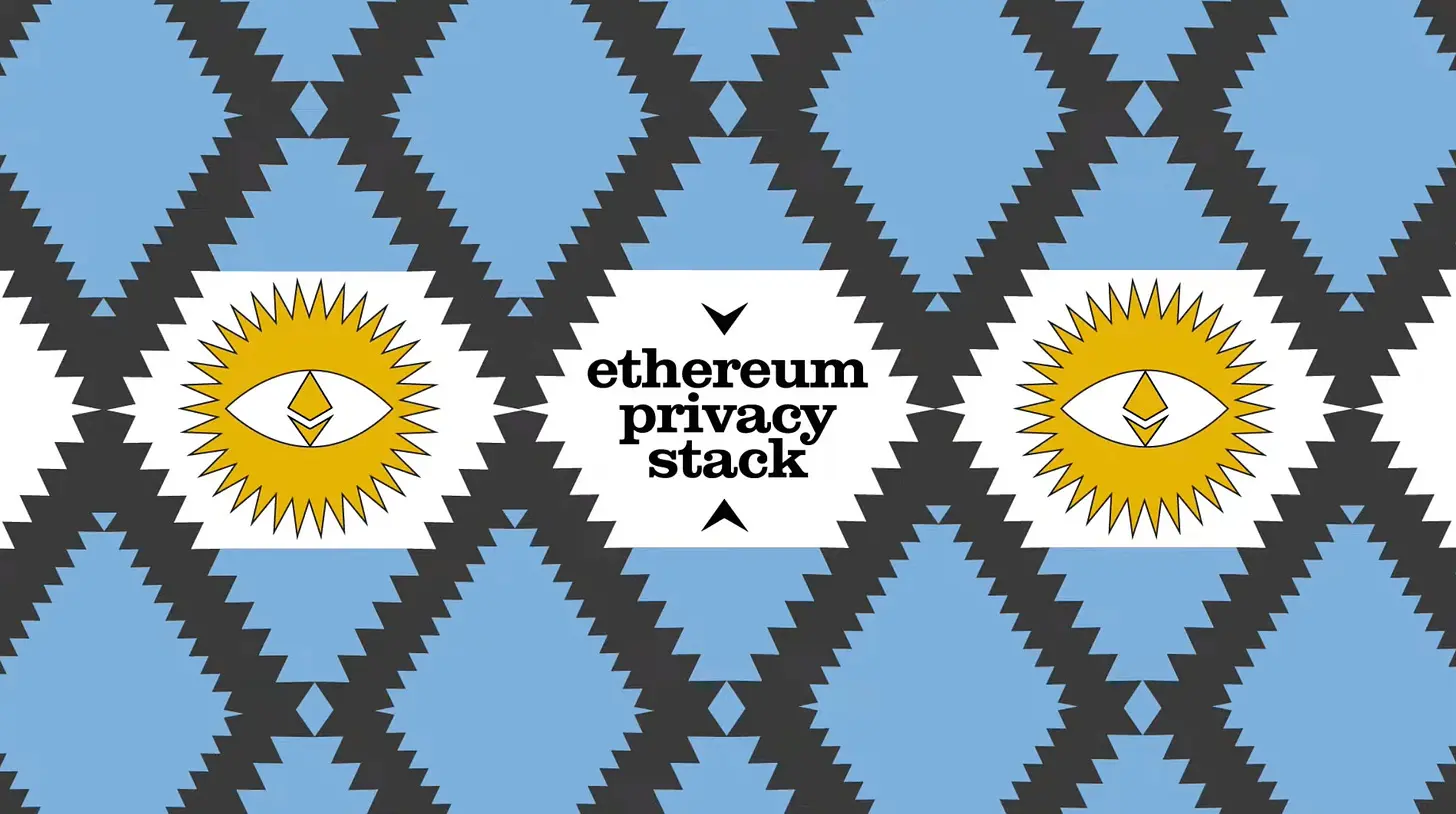

Polymarket: The Rise of Cryptocurrency Prediction Markets

